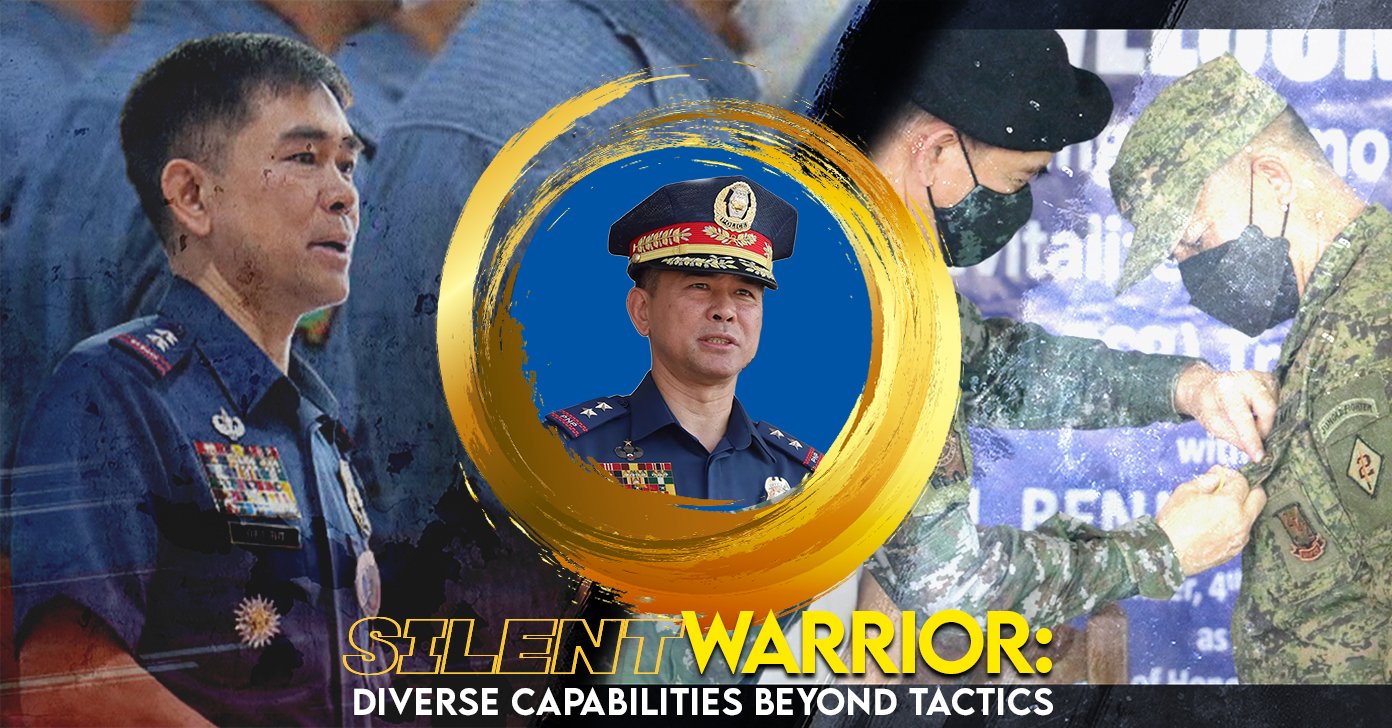Police Major General Edgar Alan Omas Okubo personifies the ‘Silent Warrior’ archetype amongst Philippine National Police (PNP) leaders. This depiction underscores his diverse capabilities, going beyond mere combat skills. This silent warrior persona encapsulates his intellectual sharpness, core values, interpersonal connections, and broader goals of distinguished accomplishments. It isn’t solely about tactical prowess – it delves deeper into his identity, his understanding of operational law enforcement.
Background: Roots and Policing Career
PMGEN Okubo originates from the high terrains of the Cordillera in Baguio City, an Igorot. This quiet demeanor reflects his cultural roots as a member of the Ibaloi ethnic community from Benguet. Growing up in Baguio, PMGEN Okubo was nurtured by his parents, Mr. Eusebio C. Okubo and Mrs. Lucia O. Okubo. His great-grandfather’s Japanese lineage adds to his diverse heritage, giving him a unique blend of cultural influences. He shares a blissful marriage with Myrene Ordillo Okubo, raising their three delightful daughters: Tamika, Edgie, and Lalainne.
Okubo began his journey in law enforcement at the Philippine National Police Academy, successfully graduating and aligning himself with the PNPA ‘Tagapagpatupad’ Class of 1992. He is the first Lakan, or PNPA graduate, to take the helm of the PNP’s elite Special Action Force (SAF), a counter-insurgency and anti-terrorism unit, and the National Capital Region Police Office (NCRPO), the largest regional police entity. Historically, these two police units were predominantly commanded by Cavaliers, the graduates of the Philippine Military Academy.
Early Leadership: Silent Warrior
His early years of service in the Special Action Force reflected his silent warrior persona. He displayed deep-seated patriotism and commitment as a commanding officer (CO) for the 1st and 2nd Special Action Battalions and the Light Reaction Group. He served in these field units where his life was repeatedly put at risk, a testament to which is the three (3) PNP Wounded Personnel Medals he received from former SAF Director PCSUPT Dalumpines and former Chief of the PNP, Gen Panfilo Lacson, respectively. As the CO of the Light Reaction Group, Okubo spearheaded a SAF operation against armed robbers in Alabang, Muntinlupa, leading to six fatalities, two arrests, and the recovery of 10 high-powered firearms and substantial loot. Okubo and Sgt Guevarra, unfortunately, got injured during the operation – with Sgt Guevarra tragically losing his life – but their team managed to successfully neutralize the suspects, who were identified as dismissed Army Scout Rangers. Concurrently, as CO of the Deep Reconnaissance Company and 22nd Special Action Company, Okubo steered the elite SAF units in infiltrating enemy lines, combating the Communist Terrorist Group (CTG), collecting intelligence in the Zamboanga Peninsula and eradicating CTG activities in the Negros Island.
After his SAF tenure, assuming leadership of the Nueva Ecija Provincial Mobile Force Battalion, where he headed an operation against HMB (Hukbong Magpapalaya ng Bayan) in Rizal, Nueva Ecija, resulting in eight rebel deaths. These rebels, attempting to instigate terror and banditry in Nueva Ecija after entering from Pampanga, were successfully thwarted by Okubo’s team following reports by the local community. Throughout his tenure with the Special Action Force and beyond, Okubo exemplified a ‘silent warrior’ persona, leading elite units against various threats and demonstrating unwavering commitment to safeguard his nation, even at significant personal risk.
Significant Police Units Led
Confronting two of his most substantial and challenging professional journeys, Okubo served as the 27th Director of the Special Action Force, where he led over six thousand elite troopers in tackling insurgency, terrorism, and criminality for seven months and lately commanding the National Capital Region Police Office with the strength of over twenty-three thousand cops, overseeing five police districts and serving sixteen urbanized cities with 14.7 million population.
Assuming the role of SAF Director, Okubo established a crucial ‘liaison’ role between the government and underserved communities, ensuring the delivery of essential services via the Revitalized-Pulis Sa Barangay (R-PSB) program and implementing eight R-PSB training programs which led to the deployment of 554 personnel in 20 locations nationwide, especially those with limited governmental support. A prime example was the R-PSB 91SAC deployment in the high-risk barangay of Dumagmang, where a past incident had resulted in five police casualties. Okubo’s leadership fostered improved community relations and ensured essential service delivery through enhanced road access. He also introduced ‘out-of-the-box’ policing by deploying a SAF company in Barangay 166, Caloocan City, to alleviate a protracted issue of informal settlers, thus enabling voluntary relocations. Furthermore, Okubo courageously redeployed SAF units to confront residual guerilla fronts and local terrorist groups, a contentious yet crucial step he believed necessary to end the long-standing conflict. Finding the R-PSB roots, this concept was institutionalized during his tenure as the Deputy Regional Director for Operations in the Davao region, which later became a vital part of the SAF’s modus operandi, transforming the SAF unit from a reactive to a proactive force. This Okubo-initiated concept led to a significant victory, with 153 CTG members surrendering under the SAF’s implementation of the R-PSB, resonating with Sun Tzu’s philosophy of winning without a fight.
Taking the helm of the NCRPO, PMGEN Okubo focused on increasing police visibility in the community, moving from an initial 20% to an achieved 43%, with an ultimate target of 70%. To enhance community relations, he trained 466 female officers as Customer Relations Officers, addressing studies indicating customer hesitance towards male desk officers, thereby fostering more robust connections between the police and the local community. Okubo also prepared 240 personnel for R-PSB duties and assignments in crime and drug-prone barangays, aiming to connect communities to government services. Under this plan, identified drug users will undergo livelihood training and be linked to employment opportunities through responsible stakeholders. Simultaneously, Okubo enforced a ‘one strike’ policy to hold Chiefs of Police accountable for their performance. This approach resulted in the relief of the Chiefs of Police from Pasay and Muntinlupa cities due to negligence, leading to prisoner escapes and extortion cases, respectively.
Other Achievements and Leadership Roles
In 2017, Okubo, serving as the Battalion Commander of the Regional Mobile Force Battalion, PRO 1, led Internal Security Operations that kept the provinces of Ilocos Norte, Ilocos Sur, La Union, and Pangasinan free from CTG influence, resulting in the weakening of the CTG Platoon NE-NV-EP’s stronghold in Pangasinan. Subsequently, as the Provincial Director of the Cebu Provincial Police Office from 2017 to 2018, he collaborated with the Provincial Government of Cebu to strengthen Recovery and Welfare Programs (RWP) for surrendered drug users, facilitating their return to society. In 2018, as the Chief of the Records Management Division, DPRM, Okubo launched the automation of the ONLINE PAIS SYSTEM, backed by an advanced server donated by PSSLAI, which eliminated salary overpayments by providing real-time updates on staff attrition. Later, while serving as the Chief of Staff of the Criminal Investigation and Detective Group (CIDG), he emphasized discipline, motivating all personnel to maintain integrity, thus eliminating illegal activities within the unit. Finally, from 2019 to 2022, Okubo, as Deputy Regional Director for Operations and Administration of Police Regional Office 11 in the Davao region, introduced the Revitalized-Pulis sa Barangay (R-PSB) program in Geographically Isolated Disadvantaged Areas (GIDAS). This initiative led to the surrender of the powerful CTG Guerilla Front, Pulang Bagani Command 1, and cleared CTG influence from local barangays, resulting in Davao becoming an insurgency-free region by 2022.
Service Recognition Medals and Other Prestigious Awards
Okubo’s distinguished service in the police force has won him numerous accolades, starting with 262 Medalya ng Papuri awards, followed by 25 Kagalingan and 77 Kasanayan. He also secured 7 Ugnayang Pampulisya, 5 Pagtulong sa Nasalanta, and 4 Mabuting Asal recognitions. Okubo’s bravery and heroism earned him a Medalya ng Katapangan, a Medalya ng Kadakilaan, and a Medalya ng Katangitanging Gawa. His consistent exemplary performance led to six instances of him being named the Best Senior Police Commissioned Officer in the PNP across various assignments. In 2013, the Metrobank Foundation recognized his efforts nationally by selecting him as one of the Country’s Outstanding Policemen in Service, now known as the Metrobank Outstanding Filipinos Awards, the most prestigious award of the military and police service. Also, that year, he received recognition from the local government of Baguio City as an Outstanding Citizen of Baguio.
Concluding Reflections
Police Major General Edgar Allan Omas Okubo represents a remarkable blend of quiet resilience, strategic insight, and tireless service, truly embodying the silent warrior character. His journey from the terrain of the Cordillera to the esteemed position within the Philippine National Police tells a story of dedication, courage, and impactful leadership. His innovative initiatives, be it the Revitalized-Pulis Sa Barangay program or the heightened police visibility strategy, exemplify his commitment to community well-being and national security. His impactful contributions to the PNP and the beneficial influence on emerging Lakans will significantly uplift the communities they serve. Okubo’s exemplary leadership inspires upcoming generations in law enforcement, demonstrating that even those of “silent” disposition can affect potent and significant changes in the pursuit of peace and security. As described by the Urban Dictionary, a ‘silent warrior’ is someone who excels remarkably in their field and achieves great success in what they do but remains quiet and modest about their accomplishments.
by: Byron Filog Allatog
—————————————————-
DISCLAIMER:
The views expressed in this article are those of the author. They do not necessarily reflect the position of the Philippine National Police, the Armed Forces of the Philippines, or the Philippine Government.
CSOP101 is a professional learning site for community policing advocates, practitioners, and supporters in changing the policing landscape. It is likewise issue-based, related to or addressing nation-building. The views expressed within individual blog posts (police blog and academic) are those of the author and do not reflect any official position or that of the author’s employers. Any concerns regarding this blog post or resources should be directed in first instance to byron.allatog012@gmail.com.

